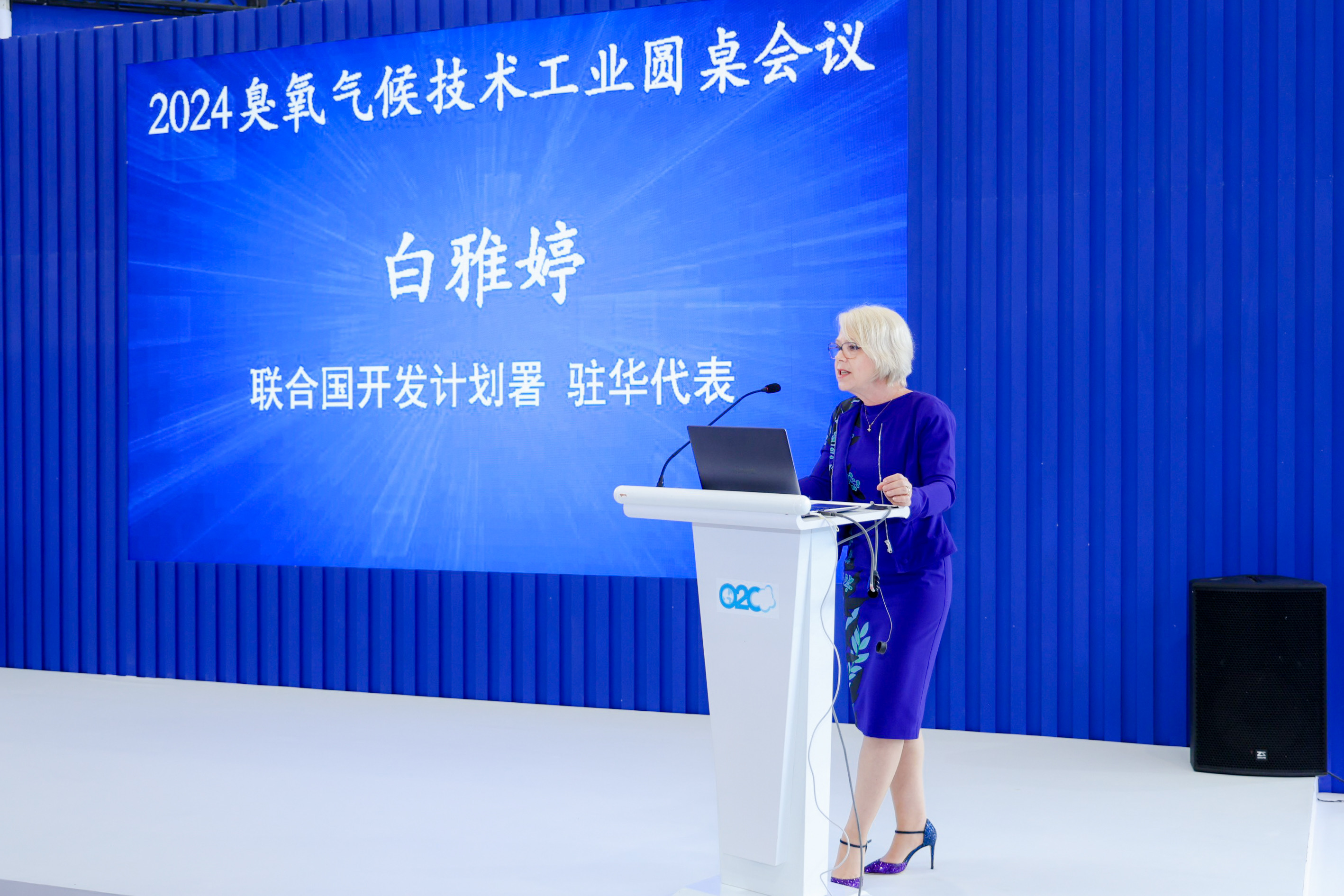Opening Remarks by Ms. Beate Trankmann at the 2024 Ozone2Climate Technology Roadshow and Industry Roundtable
April 8, 2024

UNDP Resident Representative in China, Beate Trankmann, delivered opening remarks at the 2024 Ozone2Climate Technology Roadshow and Industry Roundtable.
尊敬的田主任, 张秘书长,各位嘉宾- 下午好!
首先,我代表联合国开发计划署向大家的到来表示热烈的欢迎!感谢您们莅临本次盛会,共同探讨可持续制冷技术未来发展。
(On behalf of the United Nations Development Programme (UNDP), I warmly welcome you all to the 2024 Ozone2Climate Technology Industry Roundtable)
2023 was the hottest year on record. As global temperatures continue to rise, the demand for cooling around the world continues to increase. With the industry on pace to account for 10% of global greenhouse gas emissions by 2050,[1] humanity faces the risk of falling into a dangerous cycle: a warming climate leads to greater need for cooling, which in turn contributes to higher emissions, thereby further exacerbating the climate crisis.
As the largest producer, consumer, and exporter of HFCs globally, China is a critical partner in search of solutions. In 2021, global production of HFCs were equivalent to roughly 1.7 billion tonnes of CO2, with China accounting for over 80%. In addition, nearly 60% of the HFCs produced in China are exported as chemicals to other countries.
China’s ratification of the Kigali Amendment in 2021 was an important step – one which has been accompanied by strong enforcement of policies and regulations, implementation of concrete measures to phase out HFCs, and public awareness raising.
But more must be done. We must urgently seek new sustainable pathways to rapidly reduce HFCs.
To this end, technological innovation in cooling, as we see all around us in the exhibition halls today, is key to lowering emissions from the sector. It is thus critical to invest in research and development and continue building on existing environmentally friendly and energy-efficient solutions to help phase-out HFCs.
Additionally, we need to improve energy management by integrating and optimizing energy systems to improve efficiency. This means taking into account the sustainability of the entire energy supply chain, including the processes of energy acquisition, transmission, conversion, and utilization.
Only through systemic transformation can we achieve the goal of a truly sustainable cooling industry.
"With the deadline for the Sustainable Development Goals less than 6 years away, cooperation to advance the global climate agenda is more important than ever, and the sustainable development of cooling and refrigeration must be a part of these efforts."
Beyond the benefits for climate change, sustainable cooling also simply makes business sense as a rapidly growing industry. By actively exploring innovative products and services to meet market demand, companies can advance sustainable development, while also generating financial returns.
At UNDP, we are committed to working with China to continue promoting the transformation of the cooling industry.
Indeed, through our partnership, we have already seen many important achievements. For example, in 2019, together with the Foreign Environmental Cooperation Center (FECO), we started developing the world’s first refrigerator foaming panel that no longer emits certain HFCs in its production.
Moving forward, we stand ready to continue building on these efforts and support China in advancing similar innovative and sustainable solutions to help achieve its targets under the Montreal Protocol and Kigali Amendment.
In closing, let me thank FECO and Director-General Tian, as well as the Ministry of Ecology and Environment.
As one of the organizers of today’s exhibition, UNDP is proud to collaborate with you all to advance the development of sustainable refrigeration solutions in China.
I look forward to learning from the discussions during the upcoming sessions and hope that by sharing insights, experiences, and best practices, we can strengthen collaborative research and development.
With the deadline for the Sustainable Development Goals less than 6 years away, cooperation to advance the global climate agenda is more important than ever, and the sustainable development of cooling and refrigeration must be a part of these efforts.
Working together, we can collectively propel this industry towards a sustainable future.
Thank you!
[1] https://www.unep.org/news-and-stories/press-release/key-measures-could-slash-predicted-2050-emissions-cooling-sector#:~:text=Greenhouse%20gas%20emissions%20from%20power,of%20global%20emissions%20in%202050

 Locations
Locations

